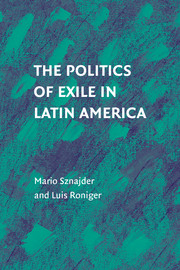Book contents
- Frontmatter
- Contents
- Acknowledgments
- List of Acronyms
- Introduction: The Politics of Exile
- 1 Defining the Exilic Condition
- 2 Forceful Displacement, the Construction of Collective Identities, and State Formation
- 3 The Format of Early Exile
- 4 Sites of Exile
- 5 Widening Exclusion and the Four-Tiered Structure of Exile
- 6 Exile Communities, Activism, and Politics
- 7 Presidents in Exile
- 8 Is Return the End of Exile?
- Bibliography
- Index
- References
7 - Presidents in Exile
Published online by Cambridge University Press: 28 July 2009
- Frontmatter
- Contents
- Acknowledgments
- List of Acronyms
- Introduction: The Politics of Exile
- 1 Defining the Exilic Condition
- 2 Forceful Displacement, the Construction of Collective Identities, and State Formation
- 3 The Format of Early Exile
- 4 Sites of Exile
- 5 Widening Exclusion and the Four-Tiered Structure of Exile
- 6 Exile Communities, Activism, and Politics
- 7 Presidents in Exile
- 8 Is Return the End of Exile?
- Bibliography
- Index
- References
Summary
In this chapter, we analyze the specific case of presidential exile. The exile of incumbent and past presidents is quantitatively only the ‘tip of the iceberg’ of exile, but qualitatively its significance for the political systems of Latin America is major. In this part of the globe, heads of state have been central vectors of politics and often defined the patterns of authority, developmental models, limits of public spheres, and range of rights and constraints for entire nations.
Ibero-American political systems inherited from colonial times a tradition of executive predominance, while republicanism and a formal division of powers were adopted. In the 19th century, most independent states assumed a presidential form of government and formally endorsed some of the ideals of the French and North American revolutions as well as elitist Liberalism, much influenced by British thought. In practice, presidents enjoyed a status far above crisscrossing institutional controls, even though in certain cases heads of state accepted limits on their power and agreed to the constitutionalization of opposition rights, such as primarily in mid-19th-century Chile and somehow also in imperial Brazil. In most cases, however, the U.S. practice of checks and balances, the French conception of separation of powers, and the British form of parliamentarian controls were constrained in practice. Far more important than constitutional provisions was, in practice, the president in his character as Primer magistrado and Jefe de Estado, becoming in many cases supreme judge and ultimate guide over public affairs and, in extreme cases, even over the lives and fortunes of individual citizens.
- Type
- Chapter
- Information
- The Politics of Exile in Latin America , pp. 257 - 285Publisher: Cambridge University PressPrint publication year: 2009
References
- 1
- Cited by



